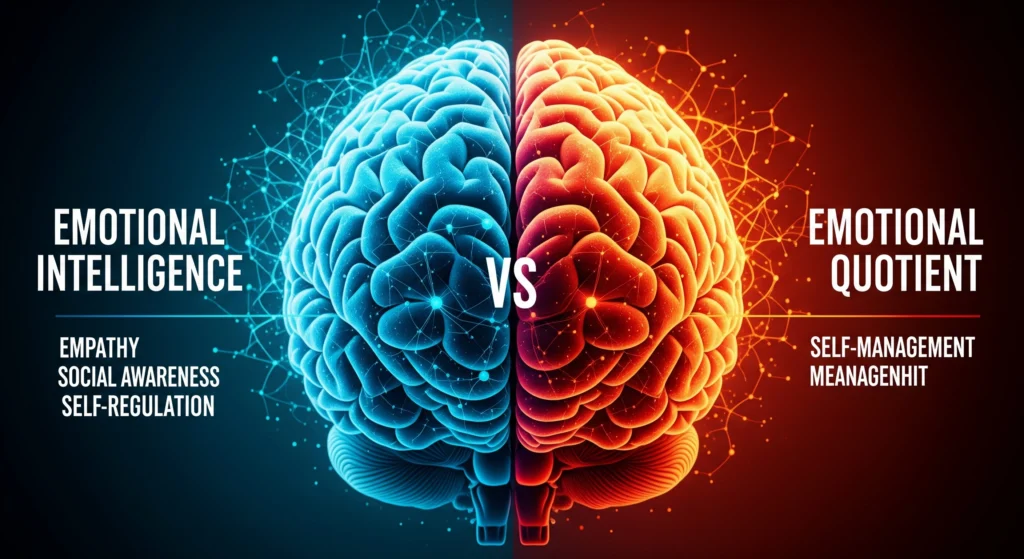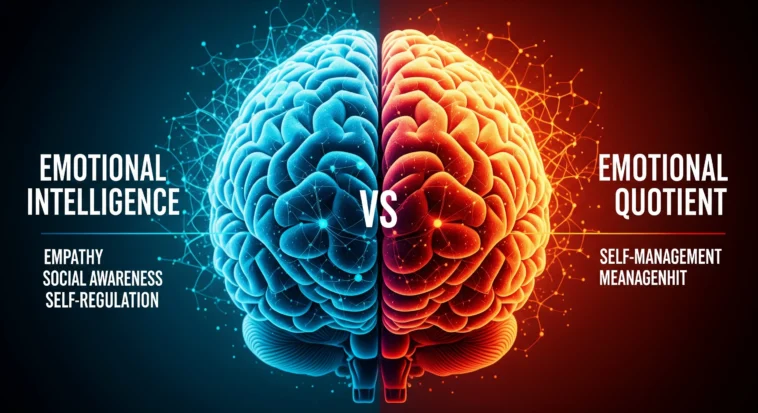
In today’s workplace, the real game-changer isn’t just skill or talent—it’s how well you understand and handle emotions.
That’s what separates “just okay” workers from leaders everyone looks up to.
But here’s the catch: people throw around words like emotional intelligence and emotional quotient without really knowing the difference.
And that confusion? It’s not just nerdy jargon—it actually affects how companies train people, pick leaders, and keep teams strong.
What Is Emotional Intelligence?
Emotional intelligence (EI) is your real-world brain cheat code for feelings — knowing what you’re feeling, why it matters, and using that to act smarter with yourself and others.
Picture catching the tiny change in a teammate’s tone on a video call and steering the conversation so it doesn’t blow up. That’s EI in action.
The concept was popularized by psychologist Daniel Goleman in the 1990s, who identified five core components of emotional intelligence:
Self-awareness
This is noticing your emotions the moment they pop up.
Like realizing you’re getting salty before you text back and choosing not to.
A self-aware person spots the mood and avoids doing something they’ll regret.
Self-regulation
Not bottling up feelings — steering them. Think of it as pausing, taking a breath, and answering instead of snapping.
It’s how you turn irritation into a calm reply that actually fixes things.
Motivation
This is the inner fire — wanting to improve because you care, not just for likes or grades.
Imagine grinding at a game level over and over because you actually want to beat it, not just to show off.
Empathy
More than “feeling bad” for someone — it’s seeing the world from their shoes.
Like noticing a friend is quiet and asking what’s up instead of assuming they’re fine.
Empathy helps you connect and lead without being a bossy robot.
Social skills
How you use all the above with other people — talking, resolving fights, getting everyone to work together.
It’s being the glue in a group project: calm, clear, and everyone trusts you.
What Is Emotional Quotient?
Emotional quotient (EQ) is basically the scorecard for your emotional intelligence — kind of like how IQ measures book smarts.
Instead of just saying “yeah, I’m good with feelings,” EQ gives you a number that shows how well you actually use emotions to make smart choices and work with people.
The most popular test is called the EQ-i, and it breaks EI down into measurable parts so companies can compare and develop leaders.
EQ assessments usually come in three flavors:
Self-reporting
You answer surveys about yourself. Easy, but people often give the “good kid” answers instead of being real.
Like checking “I never procrastinate” when your homework’s still sitting in your bag.
Other-reporting
Your teachers, friends, or teammates rate you. This 360° view shows how you actually come across.
You might think you’re funny, but others might say “nah, he’s kinda sarcastic.”
Ability-based
This is the real-deal test. You’re given situations — like calming down a heated group chat — and your choices show how strong your EQ really is.
The Critical Distinction
Here’s a simple table that shows the critical distinction between Emotional Intelligence (EI) and Emotional Quotient (EQ):
| Aspect | Emotional Intelligence (EI) |
Emotional Quotient (EQ)
|
| Definition | The ability to recognize, understand, manage, and use emotions effectively. |
The measurement or score that tells you how strong your emotional intelligence is.
|
| Nature | A skill set — something you can practice and improve, like learning guitar or basketball. |
A metric — like a report card or game score showing where you stand right now.
|
| Focus | How you apply emotions in real life (self-awareness, empathy, regulation, etc.). |
How your emotional skills are quantified and compared.
|
| Origin | Popularized by Daniel Goleman in the 1990s. |
Developed through psychological assessments (e.g., EQ-i).
|
| Examples | Noticing your frustration rising and calming down before replying. |
Scoring high on an EQ test because you handled conflict or empathy questions well.
|
| Use in Workplace | Helps with leadership, teamwork, communication, and decision-making. |
Helps organizations assess, train, and identify leaders based on emotional skills.
|
Why This Distinction Matters in the Workplace
knowing the difference between EI (the skill) and EQ (the score) actually changes how companies hire, train, and grow leaders.
Hiring and recruitment
When it comes to hiring, bosses aren’t just hunting for people who can code or crunch numbers.
In fact, 71% of employers say emotional intelligence matters more than technical skills.
But here’s the catch: if a company only looks at EQ test scores, they can totally miss gems — like that one kid in class who never tests well but is amazing at calming everyone down during group chaos.
On the flip side, someone might ace the test but flop when it’s time to actually deal with people.
Performance management systems
For performance, EI isn’t just about a number — it’s about what you do.
Research shows EI predicts 58% of job success (that’s more than half!).
Translation: how you handle your emotions and others’ emotions can matter way more than your GPA.
That’s why smart managers watch real behaviors — like how you bounce back from criticism — instead of just looking at scores.
Leadership development programs
EQ tests can give a starting point, but real growth happens in the trenches.
It’s like basketball: drills help, but you only level up when you actually play games, get coached, and learn from mistakes.
Leaders sharpen EI by practicing empathy, handling tough conversations, and building trust — not just by getting a high number on a test.
Measuring Emotional Intelligence vs Emotional Quotient
Here’s where it gets interesting: how we measure EI versus EQ really shows the difference between the two.
Emotional intelligence is messy, human, and depends on context — so you can’t just slap a score on it and call it a day.
Behavioral observation
With EI, the best way to measure it is by watching people in action.
Think about it like gym class: you don’t just say you can play basketball, the teacher watches how you dribble, pass, and react under pressure.
Same with EI — managers look at how you handle conflict in meetings, take tough feedback, or help a stressed-out teammate.
360-degree feedback
Then there’s 360-degree feedback.
That’s when not just your boss, but your friends, coworkers, and even the people you lead give input.
It’s like getting graded by everyone in your group project.
Sure, one person might think you’re chill, but if everyone says you’re good at keeping the vibe positive, that’s real proof.
Situational judgment tests
Situational judgment tests are another way — they throw fake-but-realistic scenarios at you and see how you’d respond.
Kind of like those “what would you do if…” TikToks, but for work. They show whether you can stay cool and make smart choices when emotions are running high.
Developing Your Emotional Capabilities
If you want to get better at emotions—whether to raise your EQ score or just not freak out in front of your squad—you’ve got to practice on purpose.
Here’s how to train it like a skill, not wishful thinking.
Mindfulness practices
Want to catch your feelings before they hijack you?
Try short mindfulness stuff: breathe for 30 seconds before replying to a rant, jot one-sentence journal notes after school, or take a 2-minute “pause” when you feel hot.
I once saw a teammate avoid a nasty group-chat meltdown by pausing for ten seconds—saved the whole project. That’s self-awareness in action.
Active listening skills
Stop planning your comeback and actually listen.
Give full attention, ask “what do you mean?” instead of assuming, and repeat back what you heard.
Think about the last time a friend told you something serious and you felt soothed just because they didn’t interrupt—that’s empathy practice.
Emotional vocabulary expansion
Swap “I’m mad” for “I’m frustrated and disappointed.”
Adding words makes feelings less fuzzy and easier to manage.
It’s like upgrading from “ok” to “actually, this sucks because…” — suddenly you know what to do next.
Conflict resolution practice
Every awkward conversation is a training round.
Practice staying calm, naming feelings, and finding what you both want.
Like turning a screaming group-project fight into a plan: “I feel ignored, can we split tasks differently?” Each try builds self-regulation and social skill muscle.
Feedback seeking and integration
Ask for real feedback from people who’ll tell you the truth—friends, teachers, or a coach.
“Hey, did I come off harsh in that meeting?” Then actually use what they say to make a plan.
Fast improvement comes from hearing the outside view and changing your play.
The Future of Emotional Intelligence in Professional Settings
Work is changing fast, and knowing the difference between EI (the skill) and EQ (the score) is becoming a huge deal.
Remote and hybrid jobs make it harder to build real connections, so strong emotional intelligence is more valuable than ever.
Forbes even called EI the #1 leadership skill of 2024.
Translation: future leaders won’t win by just chasing high EQ test scores—they’ll win by actually living these skills.
Imagine two captains: one brags about their “score,” the other calms the team during chaos. Who do you think people follow?
Big companies are catching on too. In fact, 75% of Fortune 500 firms are already training employees on EI, proving this isn’t just a trend—it’s the future of leadership.
Conclusion
The difference between EI and EQ might sound small, but it’s a game-changer for your future. EI is the real skill—how you actually handle emotions and people.
EQ is just the scorecard that tracks it.
Here’s the trick: don’t get obsessed with chasing numbers. Focus on building real emotional muscles—through practice, feedback, and learning from tough situations.
Use EQ tests as a mirror, not the goal.
As you grow in your career, EI will matter even more than now.
The people who win won’t just be the smartest—they’ll be the ones who can read the room, calm the storm, and lead with empathy.
Tests will change, but the need for emotional intelligence? That’s forever.



